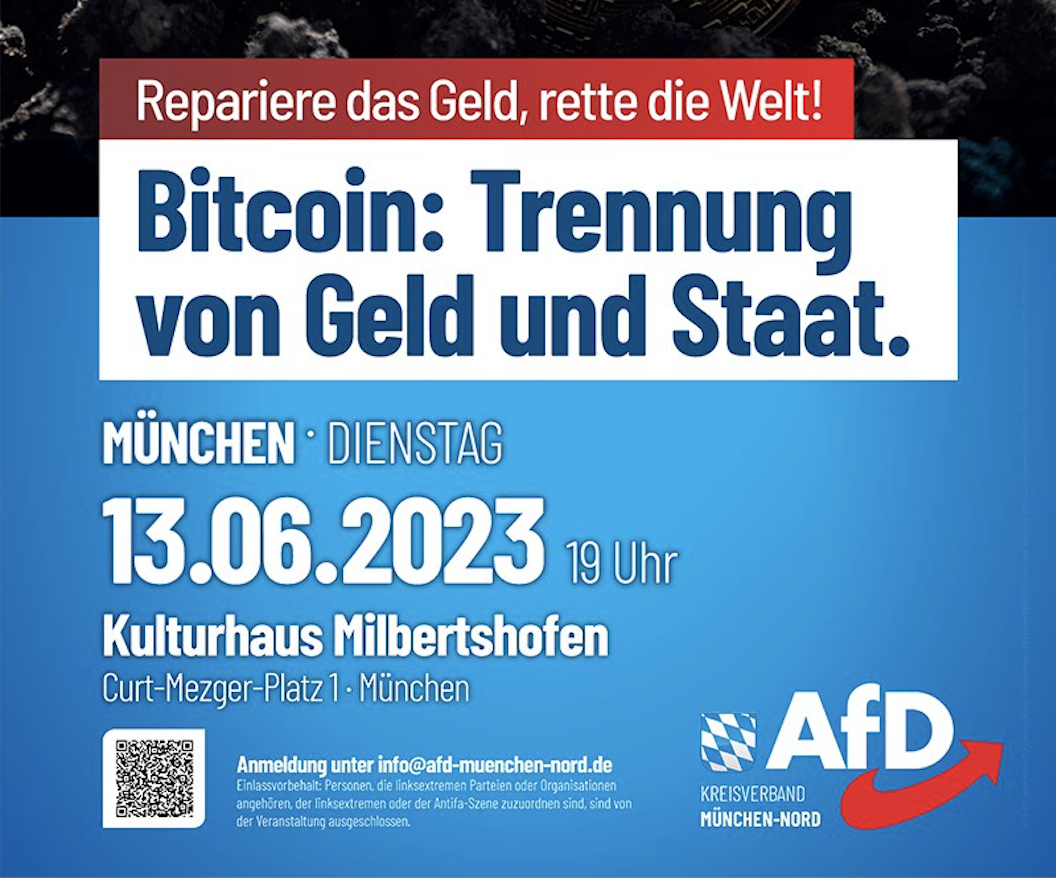The AfD parliamentary group in the Bundestag has submitted a so-called minor interpellation on the subject of Bitcoin. Eleven AfD MPs, including Beatrix von Storch, asked ten questions aimed at finding out what the German government's stance on Bitcoin is and whether there are any plans for state restrictions.
AfD sympathizes with Bitcoin?
Right at the beginning of the question, it becomes clear that the AfD parliamentary group is well-disposed towards Bitcoin.
Independent of digital central bank money, Bitcoin has established itself as the most relevant and technically sound digital currency standard over the past 14 years or so. Of all existing cryptocurrencies, Bitcoin has, in the opinion of the questioners, best solved the so-called blockchain trilemma (decentralization, scalability and security).
From the small question
For the last part of the statement, the MPs cite the article "Bitcoin, not Blockchain" by Parker Lewis, which suggests a deeper research work that led the politicians to the conclusion that Bitcoin is the undisputed number one cryptocurrency.
Since the AfD was founded in 2013 as a party with an economic focus in protest against the euro bailout policy, the sympathy for Bitcoin is hardly surprising. After all, Bitcoin is also a reaction to the state bailouts during the 2008 financial crisis, as Satoshi Nakamoto immortalized the headline for the second bailout package for the banks in the Genesis block.
Today, the AfD is better known for its criticism of migration policy, although its European election manifesto still states that the euro is a "misconstruction". Instead of free competition for money, however, the right-wing conservative party advocates a return to the German mark.
The euro is a misconstruction for an economic area with 20 very different national economies and can function neither economically nor socially in this form. [...] A new German mark could regain its higher purchasing power compared to other countries. [...] Like Switzerland, we would have considerably lower inflation without the ECB's excessive money printing policy.
From the AfD's European election program
The questions to the Federal Government
The ten questions submitted by AfD politicians mainly concern the regulation of Bitcoin. For example, the MPs ask whether there are efforts to tax profits from trading cryptocurrencies differently or what the status of the implementation of the MiCa Regulation is.
The parliamentary group of the euro-critical AfD is also inquiring about the implementation of Bitcoin as a means of payment.
1. does the Federal Government currently see opportunities and/or risks in the use of the cryptocurrency Bitcoin as a means of payment or stable currency reserve?
4. in the view of the Federal Government, are there any legal, technical, economic or other framework conditions that prevent Bitcoin from being recognized as an alternative or supplementary legal tender, and if so, what are they?
6. in the view of the Federal Government, what technical and legal requirements must be met so that taxes and fees can also be paid in Bitcoin and what opportunities and risks does the Federal Government see in such a use of cryptocurrencies?
From the minor interpellation
Although the AfD generally seems to be a long way from advocating the adoption of Bitcoin as a means of payment, there does seem to be interest in the topic. The answers to the list of questions should be quite informative for the German Bitcoin community - even if politicians are not known for providing concrete answers.
Bitcoin in the Bundestag bearing fruit?
The "Bitcoin in the Bundestag" initiative launched by non-attached MP Joana Cotar has been offering education about Bitcoin for Bundestag staff for several weeks. In response to the AfD MP's minor interpellation, former AfD politician Cotar's initiative wrote on 𝕏 that the educational work is probably working.
Our educational work in the Bundestag is working. Now the @AfDimBundestag has submitted a small question, which suggests a substantially improved understanding of #Bitcoin and is very close to our draft proposal in terms of content. When @fdpbt, @spdbt et al? pic.twitter.com/zcTSrAMkC8-
Bitcoin in the Bundestag (@BTCimBundestag) May 8, 2024
However, it has not been confirmed that the Bitcoin initiative in the Bundestag is the trigger for the AfD parliamentary group's request.
It remains to be seen whether other parties will take a more in-depth and unbiased look at Bitcoin - regardless of the instigator or the motivation behind it. It is generally conceivable that the AfD, as an opposition party, could discover Bitcoin as an issue for itself. Last summer, the Munich-North district branch of the AfD organized a lecture entitled "Fix the money - save the world, Bitcoin - separation of state and money".
However, politicians from other parties have also made positive statements about Bitcoin. For example, Frank Schäffler, member of the Bundestag for the FDP. Schäffler was interviewed by Blocktrainer founder Roman Reher and pleaded for the separation of state and money as well as openness towards Bitcoin.
Politicians with this opinion are still in the minority in Germany. It will be interesting to see whether the "Bitcoin in the Bundestag" initiative, which Roman Reher also supported with his opening speech, will change this in the long term.
Good or bad for Bitcoin?
There is already a lively discussion in our free Blocktrainer forum about whether this development is good or bad for Bitcoin. While some users are eagerly awaiting the answers, others believe that "Bitcoin doesn't stand a chance in the political mainstream if the AFD deals with it". Some also see the fact that Bitcoin is generally receiving more attention at a political level as a problem.
Nevertheless, it will be interesting to see how the German government responds. However, previous small questions relating to Bitcoin and co. have mostly been formulated in relatively meaningless terms, so expectations should not be set too high.






